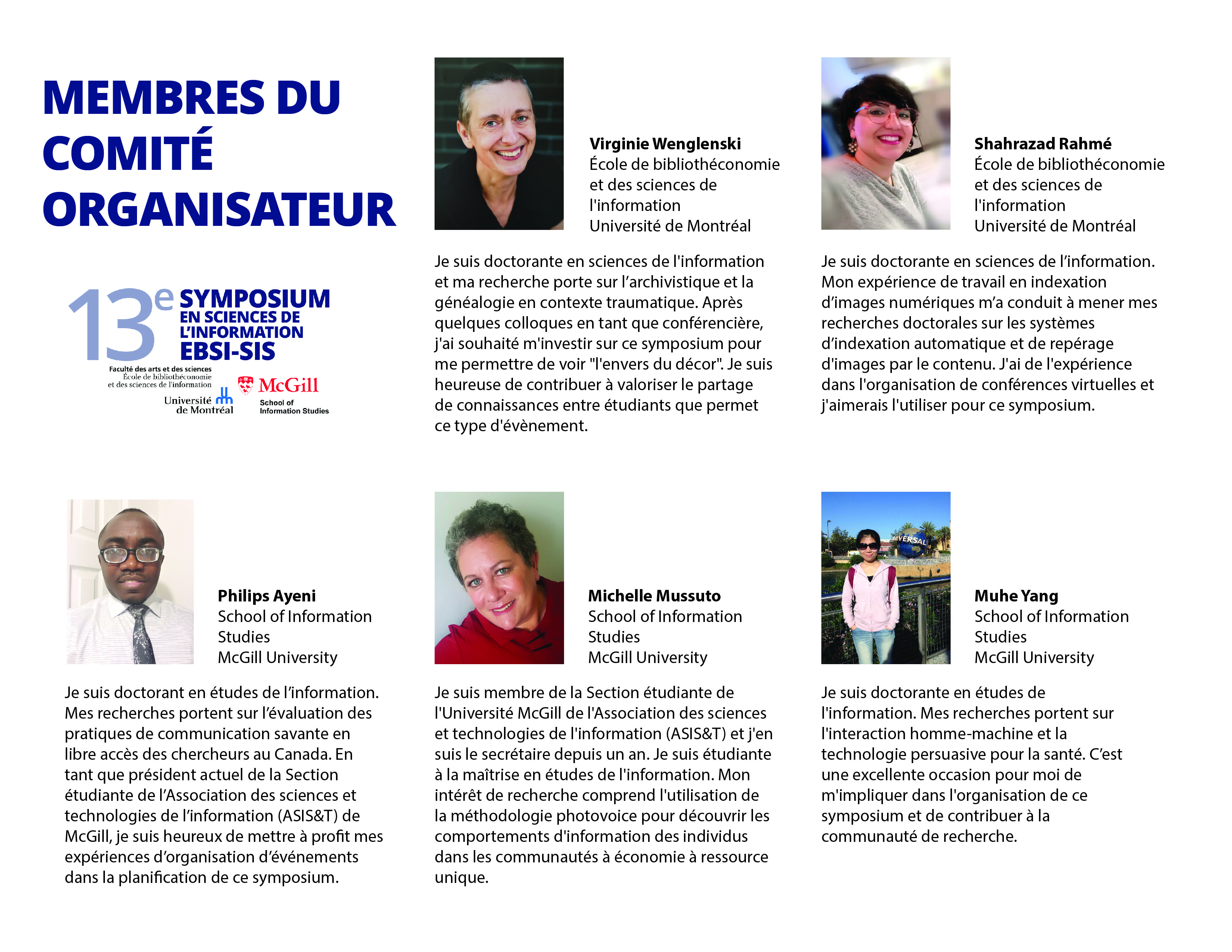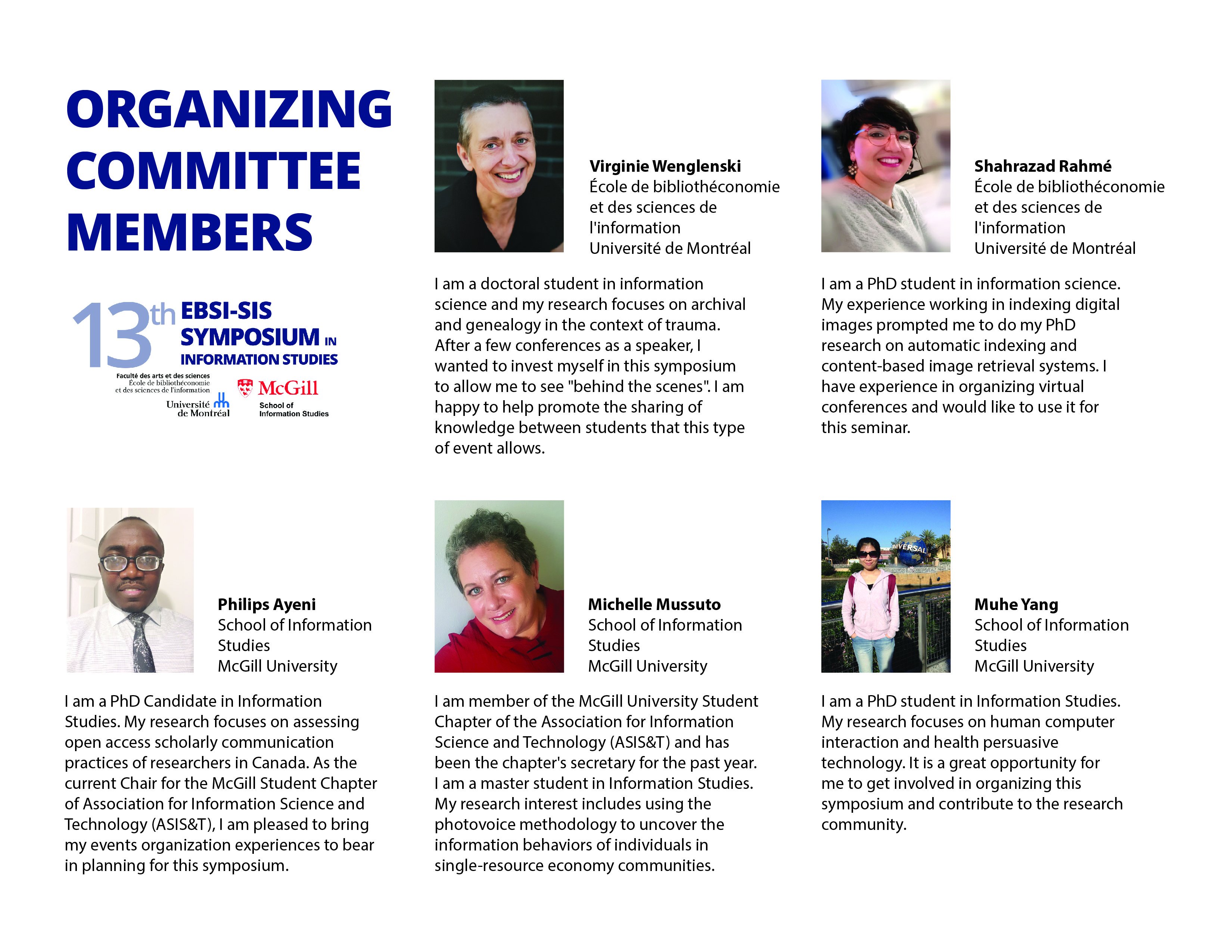Navigation dans la page / Page browsing
Annonce du symposium 2021 Symposium announcement
Programme 2021 détaillé et Visionnements / 2021 detailed program and Viewing
Membres du Jury 2021 Jury members
Membres organisateurs 2021 Organizing members
***
Annonce du symposium 2021 Symposium announcement
13affiche2021-1Programme 2021 Program
13Programme_symposium_2021Programme 2021 détaillé et Visionnements / 2021 detailed program and Viewing
Vous trouverez ci-dessous le détail des conférences qui se sont déroulées lors du 13e Symposium EBSI-SIS, par ordre d’interventions, ainsi que leurs enregistrements vidéo.
You will find below the details of the conferences that took place during the 13th EBSI-SIS Symposium, in order of presentation, as well as their video recordings.

Farah Sbeiti (Lebanese University, Lebanon)
Farah Sbeiti is a University Lecturer & Information consultant & Library project manager. She is skilled in cataloging, indexing, teaching, and research. Strong business development professional and a Ph.D. candidate in Library and Information Science at the Lebanese University. A member of the Lebanese Library Association & the Arab Union for Libraries and Information. She has worked on many projects, published many articles, and participated in several conferences (AFLI, IFLA, SLA, and LLA), webinars, and workshops in the Arab World. As a young woman, she believes we should collaborate to innovate and to focus on Women empowerment and Decision Making.
Assistive technology in the library services of Lebanese universities for students with visual needs
My proposal is a research paper about the assistive technology in the library services of Lebanese universities for people with visual needs. Universities libraries have social responsibilities to present the services to all categories of users regardless of their gender, age, race, political affiliation or disability. However, many people with visual needs have limited access to library services most especially in developing countries like Lebanon. After an observation for the non-using of technology in library services, this study focused on the 47 universities Libraries in Lebanon. Using the Questionnaire method, the study assessed the assistive technology in libraries services provision to the visually impaired by academic libraries across the country. The study aimed to identify the using of assistive technology in the services of Lebanese universities libraries for VIP students in Lebanon. The main findings revealed that we have a lack of implementation of social responsibility in most Lebanese universities. secondly, the assistive technology in university library services for people with visual needs provided by 16 university libraries only, which affects the process of attracting students with visual needs to these universities. While the material problems were among the most prominent difficulties facing libraries in acquiring, using and operating assistive technology systems. Where they could use the computer lab in the library at least by Reliance on the open source programs if they cannot afford their costs. The results of this study will help the upcoming Visual Impaired students in those universities libraries to access information and services in Lebanon.
Pour voir la présentation de/To see the presentation of Farah Sbeiti : https://youtu.be/9Ieh6ogJBxw?list=PLHgr5ZnpF46vhH43sq2Vvfo_6lkgtj8dW
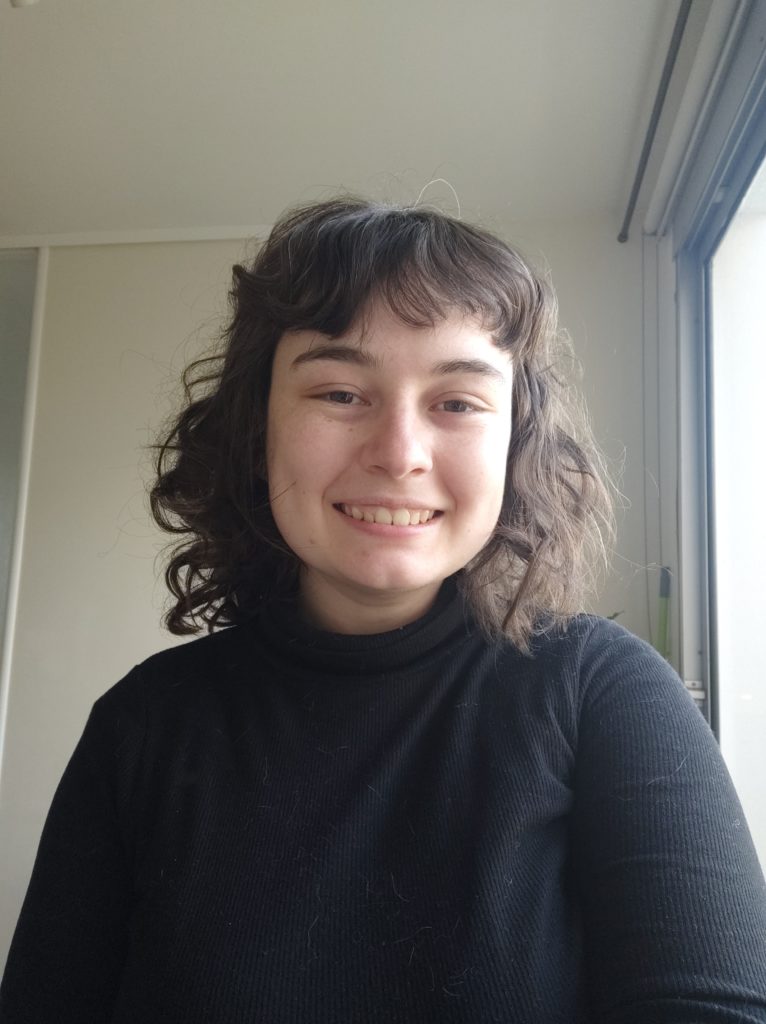
Rachel Guérin (Université d’Angers, France)
L’entrée dans les études supérieures a été pour Rachel Guérin l’occasion de concrétiser une passion à travers son admission en licence d’Histoire. Ce cursus lui a permis de découvrir les différents patrimoines et notamment celui des archives, qui a constitué une véritable révélation. C’est ainsi qu’elle a été amené à postuler au master Archives de l’Université d’Angers, master pour lequel elle réalise le mémoire de recherche qui motive sa communication. Ce dernier est centré autour d’un axe qui lui est cher, étant issue d’une famille de militant·e·s syndicalistes.
Identité militante, pratiques et normes archivistiques : le cas des Instituts CGT d’histoire sociale fédéraux de 1982 à nos jours
La communication que je vous propose porte sur le sujet de recherche que je développe dans le cadre de ma première année de master Archives. En effet, mon mémoire porte en premier lieu sur une étude des pratiques archivistiques au sein des Instituts CGT d’histoire sociale (IHS) fédéraux qui salarient un·e archiviste professionnel·le. Ce·tte dernier·e est responsable de l’ensemble de la chaîne archivistique, au sein d’un très petit service, dans le contexte particulier d’une fédération syndicale. J’analyserai également l’adhésion de ces archivistes aux normes qui font consensus au sein de la profession, mais qui sont susceptibles d’être remises en question. L’objectif est également de mettre en relation les différentes recherches, pour la plupart sociologiques, qui décrivent le rôle et la fonction de l’intellectuel·le dans la société. Je confronterai donc à la réalité des IHS fédéraux la vision de l’intellectuel·le telle que développée par Antonio Gramsci, Pierre Bourdieu, Jean-Paul Sartre ou encore Edward W. Said et Julien Benda. Ma proposition de communication contient un bref historique, une mise en contexte et les missions des IHS fédéraux. Elle présente brièvement ma problématisation ainsi que les méthodes que j’utiliserai.
Pour voir la présentation de/To see the presentation of Rachel Guérin : https://youtu.be/LhniftOeJps?list=PLHgr5ZnpF46vhH43sq2Vvfo_6lkgtj8dW

Marc-André Simard (Université de Montréal, Québec, Canada)
Marc-André Simard est étudiant au doctorat en sciences de l’information à l’école de bibliothéconomie et des sciences de l’information de l’Université de Montréal. Il détient un baccalauréat en philosophie de l’Université Laval et une maîtrise en sciences de l’information à l’Université de Montréal. Son mémoire de maîtrise portait sur la production et l’utilisation du libre accès à l’échelle internationale. Ses recherches actuelles portent sur le libre accès, le financement de la recherche et les disparités de genre dans les publications scientifiques.
Le fardeau des frais de traitement des articles sur les universités canadiennes (Marc-André Simard ; Toluwase Asubiaro ; Philippe Mongeon)
La question de l’accès aux ressources savantes a traditionnellement été associée aux coûts d’abonnement aux périodiques scientifiques. La montée récente du mouvement du libre accès aux communications savantes a toutefois mené à un nouveau phénomène, celui des frais de traitement des articles (article processing charges ; APC). Les APC sont des frais de publication généralement facturés aux auteurs/trices qui veulent rendre une publication scientifique disponible en libre accès. Ceux-ci peuvent rapporter jusqu’à 14 000 dollars (CAD) par article aux éditeurs scientifiques, parfois même en plus des coûts d’abonnements scientifiques dans le cas des revues dites hybrides. Ce projet de recherche vise à explorer les frais de traitement des articles et les abonnements aux périodiques scientifiques payés par les universités canadiennes au cours des dernières années. Nous avons croisé les données de la base de données Unpaywall avec les identifiants uniques de publication (DOI) des universités qui sont membres de l’Association des bibliothèques de recherche du Canada (CARL-ABRC) qui sont indexés dans la base de données Web of Science. Les coûts d’abonnements payés par les bibliothèques membres de l’ABRC ont également été collectés. Nos résultats démontrent que les coûts d’accès et de publications ont tous les deux augmenté au cours des dernières années, ce qui va directement à l’encontre des principes du libre accès visant à démocratiser l’accès aux documents savants.
Pour voir la présentation de/To see the presentation of Marc-André Simard : https://youtu.be/yEnye-5Ht4c?list=PLHgr5ZnpF46vhH43sq2Vvfo_6lkgtj8dW

Xiaoqian Zhang (McGill University, Quebec, Canada)
Xiaoqian (Zoey) Zhang is a first-year doctoral student McGill University’s School of Information Studies. Her research interest includes information behaviour, health information-seeking, and healthcare information.
Standing on the shoulders of giants: a review of literature reviews on information behaviour
Information behaviour research has the potential to improve the design of information systems, the implementation of social initiatives, and the quality of everyday human lives. Many reviews on information behaviour scholarship have been published to date, which have provided scholars comprehensive overviews and new insights into the field. Although the importance of literature reviews in information behaviour is widely accepted, little research has been done to understand these reviews. To fill this gap, this research summarized 97 literature reviews in the field of information behaviour. This paper found (1) there were two transformations in the history of information behaviour; (2) current research focuses on specialized areas of information behaviour; (3) the quality of information and social contributions of the research are two issues discussed among literature reviews; (4) the boom of models and theories happened in the 1990s and the early 2000s, but new models and theories are needed in digital environments. By studying information behaviour in a general and comprehensive way, this paper contributes to tracing the development and identifying key issues of information behaviour. Moreover, this paper also aims to inspire research in other fields; it provides an innovative perspective to understanding a research field with a considerable body of research: a review of literature reviews.
Pour voir la présentation de/To see the presentation of Xiaoqian Zhang : https://youtu.be/QSI4JlvU1rA?list=PLHgr5ZnpF46vhH43sq2Vvfo_6lkgtj8dW
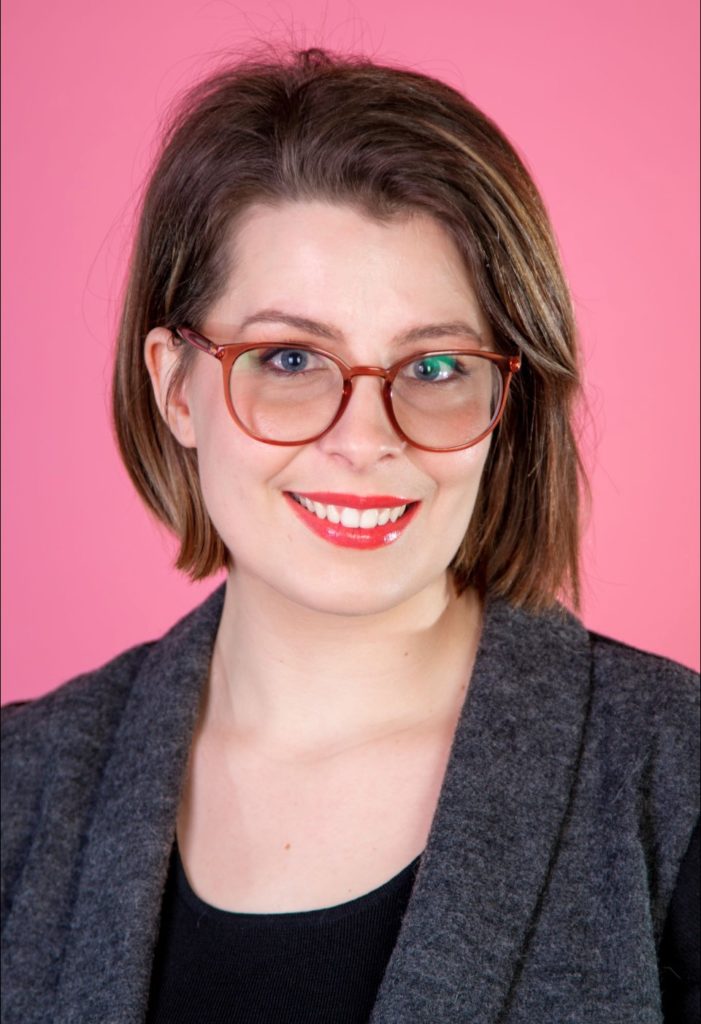
Cora-Lynn Munroe-Lynds (Dalhousie University, Nova Scotia, Canada)
Cora-Lynn is a Master of Information Student at Dalhousie University. She completed her Bachelor of Arts in 2019 at Mount Saint Vincent University with honours in History. Cora-Lynn’s research interests include social media literacy, information literacy, human information interaction and systematic research methodologies. Currently, she is completing her master’s thesis and hopes to pursuit a PhD in Information Science at Dalhousie University in 2022.
Information Literacy in Nova Scotia: Systematic Mapping of Learning Outcomes
Information literacy has never been more important for the functioning of the democratic process, and for autonomy over one’s decisions. The Association for College and Research Libraries (ACRL) created a framework for information literacy, which lists six threshold concepts that an information literate individual possesses. This paper seeks to identify where in the curriculum information literacy is promoted, and which information literacy integrated abilities are most commonly found. A systematic mapping of the information literacy threshold concepts in the course learning outcomes was conducted. Findings from this study will reveal strengths and weaknesses in IL competencies in the Nova Scotia high school courses. This study also provides recommendations for future research.
Pour voir la présentation de/To see the presentation of Cora-Lynn Munroe-Lynds : https://youtu.be/FG5B8ecIQU4?list=PLHgr5ZnpF46vhH43sq2Vvfo_6lkgtj8dW

Agnès Arendo (Université d’Angers, France)
Étudiante à l’université d’Angers, Agnès Arendo a obtenu une licence d’histoire en 2020, qui lui a permis d’intégrer le Master Archives. Autant passionnée d’archivistique que d’histoire contemporaine, elle a décidé d’effectuer son mémoire de recherche de Master 1 sur les archives de la Résistance. Son initiative vise à comprendre comment et pourquoi, dès la Libération, les métiers de l’histoire et du patrimoine ont établi l’enjeu de collecter les archives de ce mouvement clandestin, à l’intérieur de comités interministériels aux méthodes nouvelles, celles de la collecte de témoignages à visée historique.
Les archives orales comme source d’histoire récente : pratiques de collecte, usages et enjeux mémoriels. Le cas des témoignages de la Résistance des organes interministériels d’histoire de la guerre.
Avant même que la France ne soit entièrement libérée, le gouvernement provisoire crée en octobre 1944 la Commission d’histoire de l’Occupation et de la Libération de la France, puis le Comité d’histoire de la guerre l’année suivante, qui fusionnent en 1951 avec le Comité d’histoire de la seconde guerre mondiale. Leur objectif est de collecter les traces de la guerre, notamment celles de la résistance, pour permettre aux futurs historiens d’avoir accès à cette mémoire. Face aux difficultés à documenter une activité par essence clandestine, les correspondants départementaux des comités se sont lancés dans une grande enquête, marquée de manière novatrice par une collecte massive de témoignages, dans le maintien du secret et avec un délai de communicabilité de cinquante ans. Les archives orales, en plein essor, suscitent alors un grand intérêt et de vives critiques. Le témoignage est à la fois vu comme vecteur d’une nouvelle histoire, celle des mémoires, à la fois individuelle et collective, mais également porteur d’incertitudes, de mensonge, de partialité. Il est donc intéressant d’interroger le rôle qu’ont eu ces enquêteurs et enquêtrices, dans le développement du témoignage comme archives historiques. Afin d’appréhender cette question, il est nécessaire de comprendre leur démarche et leurs objectifs. La méthodologie qu’ils et elles ont peu à peu mise en place était parfois imprécise, mais a-t-elle influencé la méthodologie archivistique actuelle ?
Pour voir la présentation de/To see the presentation of Agnès Arendo : https://youtu.be/oqp2pjeid2E?list=PLHgr5ZnpF46vhH43sq2Vvfo_6lkgtj8dW
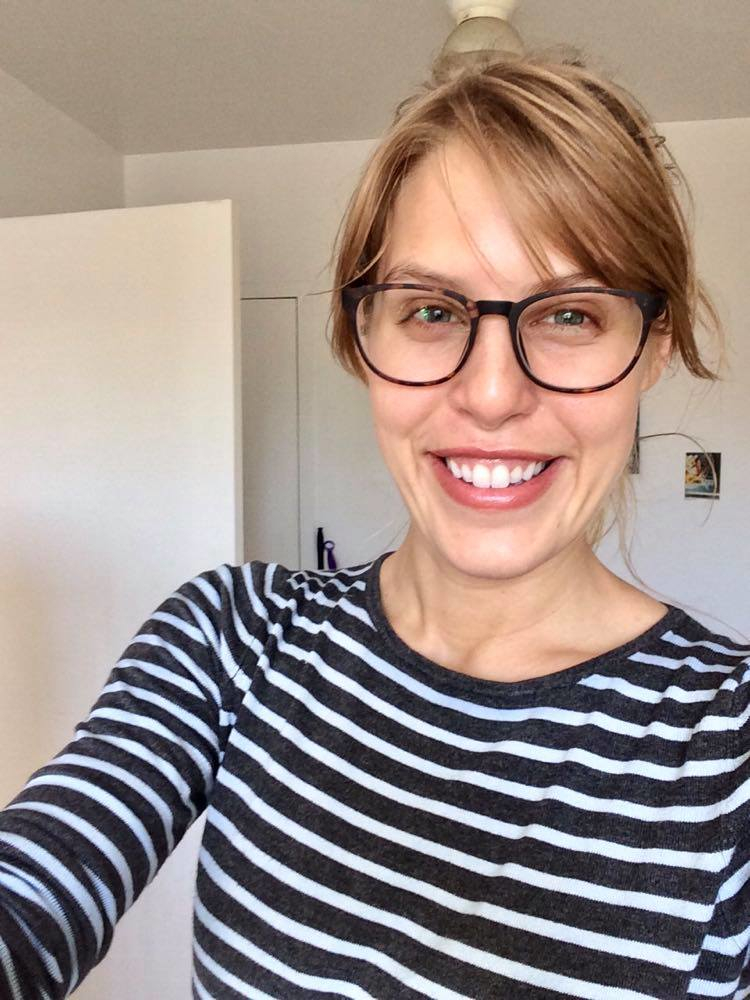
Chelsea Woodhouse (McGill University, Quebec, Canada)
Chelsea Woodhouse is a second-year student at the McGill School of Information Studies. She has a background in cultural anthropology and professional experience in medical libraries, and special library collections in Montreal. Her current research interests are focused on fact checking and information literacy initiatives relating to digital information. After graduating this spring, she hopes to continue working in special libraries and archives on web-based development and accessibility projects, as well as research and data management in the health sciences.
An Interdisciplinary Approach to False Information and Today’s Information Professional
This presentation examines fact checking, a well-known practice often associated with journalism, and its relationship to false information. As a profession and a journalistic practice, fact checking is controversial. However, preliminary studies in LIS show fact checking techniques can be an engaging and effective way to teach source evaluation of digital information. Additionally, the techniques and ethics associated with fact checking also compliment existing Information Literacy frameworks. Through the incorporation of fact checking into information literacy programs, LIS has the potential to help improve the public’s impression of fact checking as a profession and practice, while also bringing increased awareness of LIS professionals’ potential roles and identities outside of the library. Cette présentation abordera la vérification des faits, une pratique bien connue souvent associée au journalisme, et sa relation avec de fausses informations. En tant que profession et pratique journalistique, la vérification des faits est controversée. Cependant, des études préliminaires en LIS montrent que les techniques de vérification des faits peuvent être un moyen intéressant et efficace d’enseigner l’évaluation des sources d’informations numériques. De plus, les techniques et l’éthique associées à la vérification des faits complètent également les cadres de maîtrise de l’information existants. Grâce à l’incorporation de la vérification des faits dans les programmes de maîtrise de l’information, la LIS a le potentiel de contribuer à améliorer l’impression que le public a de la vérification des faits en tant que profession et pratique, tout en sensibilisant d’avantage aux rôles et aux identités potentiels des professionnels de la LIS en dehors de la bibliothèque.
Pour voir la présentation de/To see the presentation of Chelsea Woodhouse : https://youtu.be/jSDT9j2SU98?list=PLHgr5ZnpF46vhH43sq2Vvfo_6lkgtj8dW
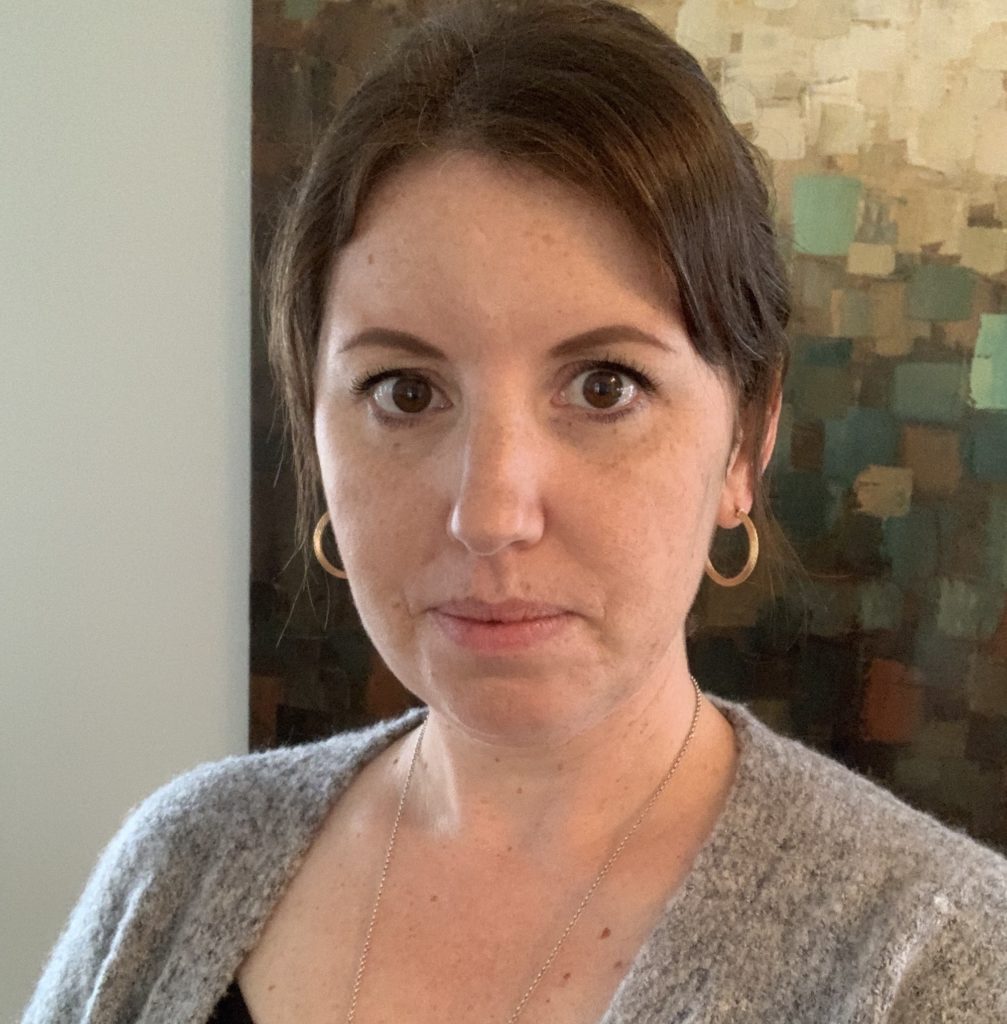
Leigh-Ann Butler (University of Ottawa, Ontario, Canada)
Leigh-Ann Butler is a Master’s student in the School of Information Studies at the University of Ottawa. Her thesis examines the economics of open access publishing and research funding. She currently works as a Policy Analyst with Natural Sciences and Engineering Research Council where she focuses her work on Open Access.
Where the money flows and revenue grows: analyzing open access article processing charges
This talk touches on a current research project that explores the amount of APCs paid by Tri-Agency grant holders when publishing OA. Researchers more often use large amounts of grant funds to pay for OA costs (APCs), which means public tax dollars are being streamed into the revenues of large commercial publishers. It is important to monitor and collect data on APC spend, especially as the APC market continues to grow, costs inflate, and business models change.
Pour voir la présentation de/To see the presentation of Leigh-Ann Butler : https://youtu.be/sIQMiDQK3PM?list=PLHgr5ZnpF46vhH43sq2Vvfo_6lkgtj8dW
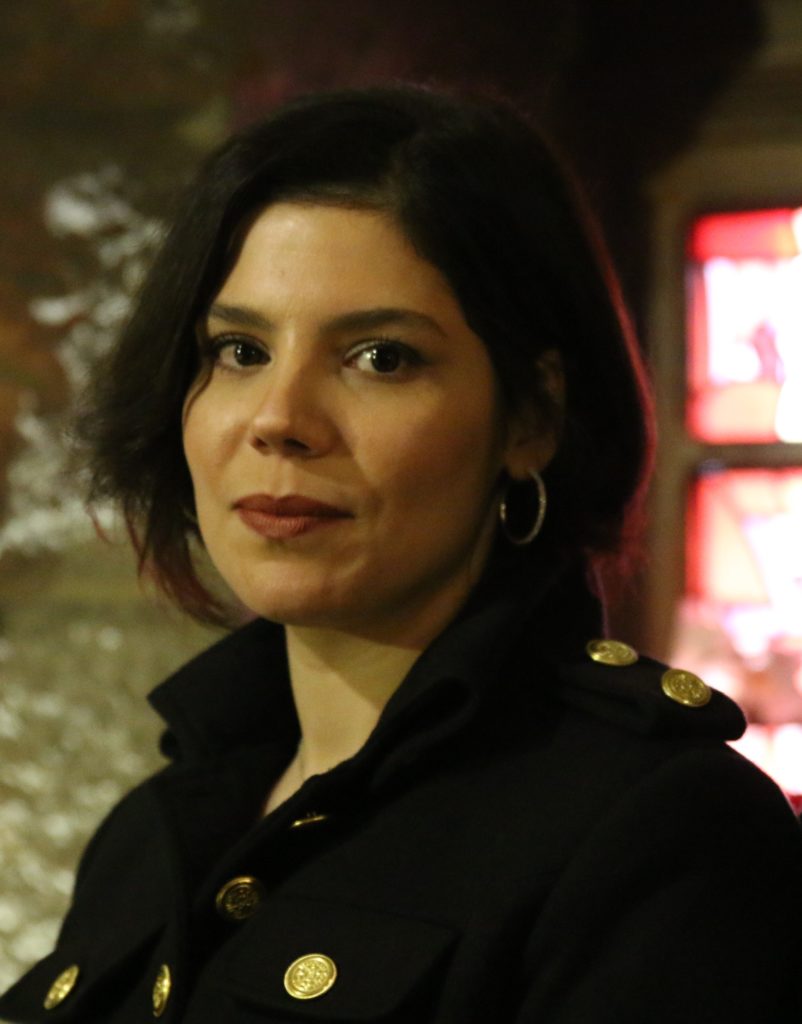
Hanady Geagea (Lebanese University, Lebanon)
Hanady Geagea est doctorante en sciences de l’information et de la communication, en cotutelle entre l’Université Libanaise au Liban et l’Université Paris-Est Marne-la-vallée en France. Sa première expérience de travail était en tant que spécialiste de l’information dans le Réseau d’Information Arabe en Education « Shamaa » et puis comme chargée de cours à l’Université Libanaise. Cela lui a amené à se concentrer dans son travail de recherche sur la culture de l’information et spécialement les compétences informationnelles des doctorants au Liban.
La culture de l’information des doctorants au Liban
Notre thèse de doctorat s’est attaquée à la culture de l’information (information literacy), un sujet tellement discuté mondialement mais rare dans notre pays. Les objectifs sont de révéler les compétences informationnelles des doctorants au Liban, d’accentuer le rôle des universités et des bibliothèques dans la formation des doctorants et de contribuer à diminuer les problèmes de recherches chez notre population. Cette recherche s’appuie sur la méthode de recherche mixte. La méthode quantitative s’est basée sur un questionnaire conçu pour notre population, inspiré par des outils de mesure international. Alors que les données qualitatives étaient recueillies à travers des interviews semi directifs. Les résultats de l’étude montrent clairement que les doctorants ont relativement un faible niveau de compétences informationnelles. Leur communauté scientifique est restreinte et limitée. Ainsi que les problèmes rencontrés durant le parcours doctoral révèlent des causes intrinsèques et extérieures aux doctorants.
Pour voir la présentation de/To see the presentation of Hanady Geagea : https://youtu.be/NSbmGMZ14Xs?list=PLHgr5ZnpF46vhH43sq2Vvfo_6lkgtj8dW
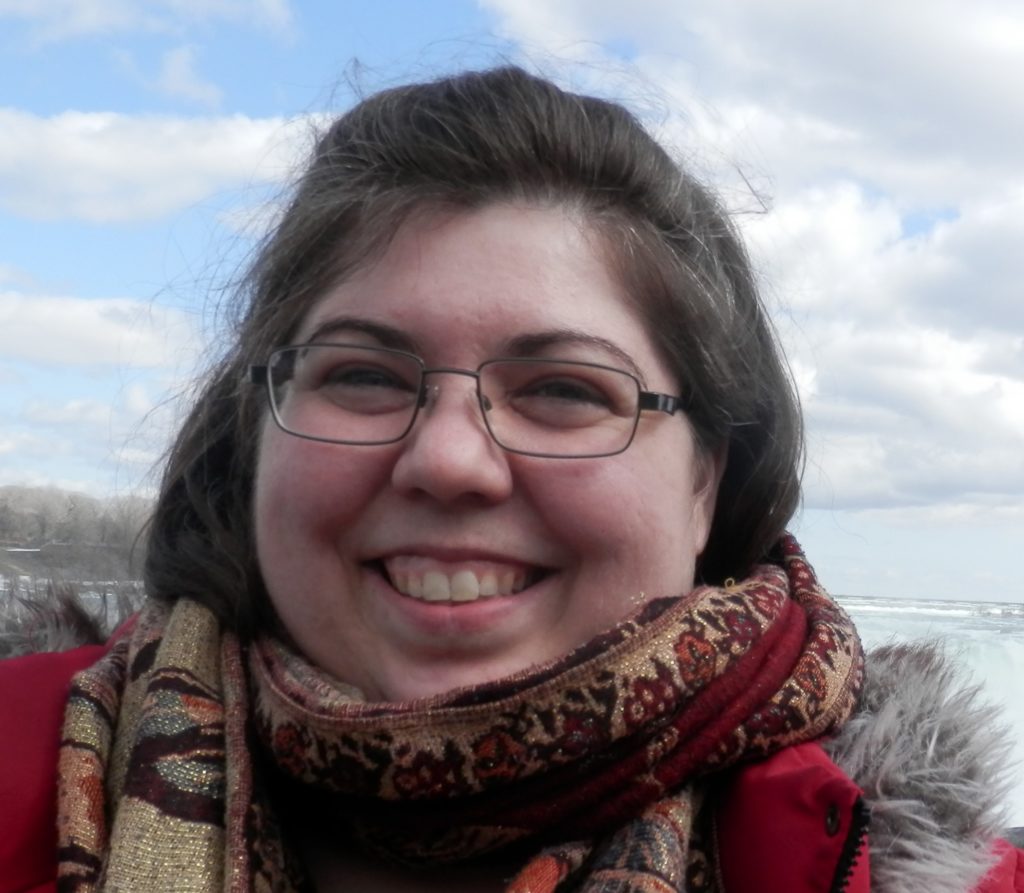
Stéphanie Courchesne (Université de Montréal, Québec, Canada)
Stéphanie Courchesne est présentement doctorante à l’EBSI. Dans les dernières années, elle a partagé son temps entre l’université et les bibliothèques. Elle a travaillé pendant plus de douze ans en bibliothèques, d’abord dans le réseau scolaire, ensuite pour la Ville de Montréal et la Ville de Gatineau, avant d’être médiathécaire pour Radio-Canada. En parallèle de son travail, elle a fait des études en anthropologie avant d’entreprendre le profil « recherche » de la maîtrise à l’EBSI. Sa solide expérience en recherche lui a permis de mener à bien un imposant mémoire ayant pour titre : « Compatibilité entre troisième lieu et clientèles difficiles : perceptions professionnelles du rôle social des bibliothèques ». Pour sa recherche doctorale, elle s’intéresse à l’identité professionnelle des bibliothécaires, aux limites de la profession et aux partenariats extérieurs.
L’identité professionnelle des bibliothécaires publiques : changements et réinventions pour répondre aux nouvelles réalités de la profession.
Notre présentation par affiche vise à faire connaître le devis méthodologique de notre projet doctoral et ses principales caractéristiques, c’est-à-dire le sujet de notre recherche, le but, les questions de recherche, l’approche conceptuelle, la méthode de collecte et l’analyse envisagée, la population cible et l’échantillonnage.

Alamir Novin (University of British Columbia, British Columbia, Canada)
Alamir Novin is a Ph.D. candidate attending the School of Information at UBC. His research experiments with the cognitive biases that affect users searching online. His research is interdisciplinary and won awards from conferences in three different areas: education, humancomputer interactions, and information retrieval. He’s associated with various academic organizations at UBC including becoming the first president of the Doctoral Student Association and was the former PhD representative for Designing for People (a large interdisciplinary collective at UBC interested in human-computer interactions). Throughout his time with these various organizations he spread awareness of the importance of the public’s responsibilities in science communication.
The Cognitive Biases that Emerge from Search as Learning
In this current era of “fake news” accusations and pandemic misinformation, the public is left to dispel misinformation via their own research skills. Compounding this challenge of encountering online misinformation are the “Stay at Home” protocols forcing student to learn outside of the classroom and more on their online research skills. To address these issues, it is important to question how online research leads people to misinform themselves? Can Google’s algorithm unintentionally bias users? This dissertation approaches these questions with three cumulative studies (N=164). The first study asked students (N=60) to interact with a mock Google page. The query was about a science topic that contained multiple valid perspectives. Participants first ranked the usefulness of the search results and then used them in a writing task. The study discovered that Google’s presentation of results (i.e., the order and genre of the sources presented) influenced how students wrote about the topic. Four types of cognitive biases explaining this discrepancy were identified (i.e., Priming, Anchoring, Framing, and the Availability heuristic). The most concerning of the four was the Framing bias. Framing occurs when the wording of information influences people’s decisions. For example, prior studies found that framing the famous prisoner’s dilemma as a “collaborative task” influenced people’s altruism. Similarly, this dissertation found that Google’s algorithm framed results to influence the participants’ interactions with specific results at the expense of more useful ones. The second study repeated the first’s methodology, but examined whether experts (N=40) on the query’s topic were affected differently than the general student population. The four cognitive biases were detected again, but the Framing bias influenced less experts (47%) than novices (73%). Interestingly, in both studies there were some participants who were not significantly affected by framing. The third study in this dissertation (N=50) investigates why and how these latter participants avoid framing. The methodology of the first two studies is repeated, but this time the entire search task itself is purposely framed to examine whether and how participants counter a frame’s influence. Understanding how the participants avoid biases will provide insights for developing digital search skills for both students and the general public.
Pour voir la présentation de/To see the presentation of Alamir Novin : https://youtu.be/suhiXa0Zw6M?list=PLHgr5ZnpF46vhH43sq2Vvfo_6lkgtj8dW

Juan Pablo Alperin – Assistant Professor at the School of Publishing, Associate Director of Research of the Public Knowledge Project, Co-director of the Scholarly Communications Lab (Simon Fraser University, British Colombia, Canada)
Juan Pablo Alperin is a multidisciplinary scholar, with training in computer science, geography, and education who believes that research, especially when it is made freely available, has the potential to make meaningful and direct contributions to society.
Pour voir la présentation de/To see the presentation of Juan Pablo Alperin : https://youtu.be/77xQMO89bnk?list=PLHgr5ZnpF46vhH43sq2Vvfo_6lkgtj8dW
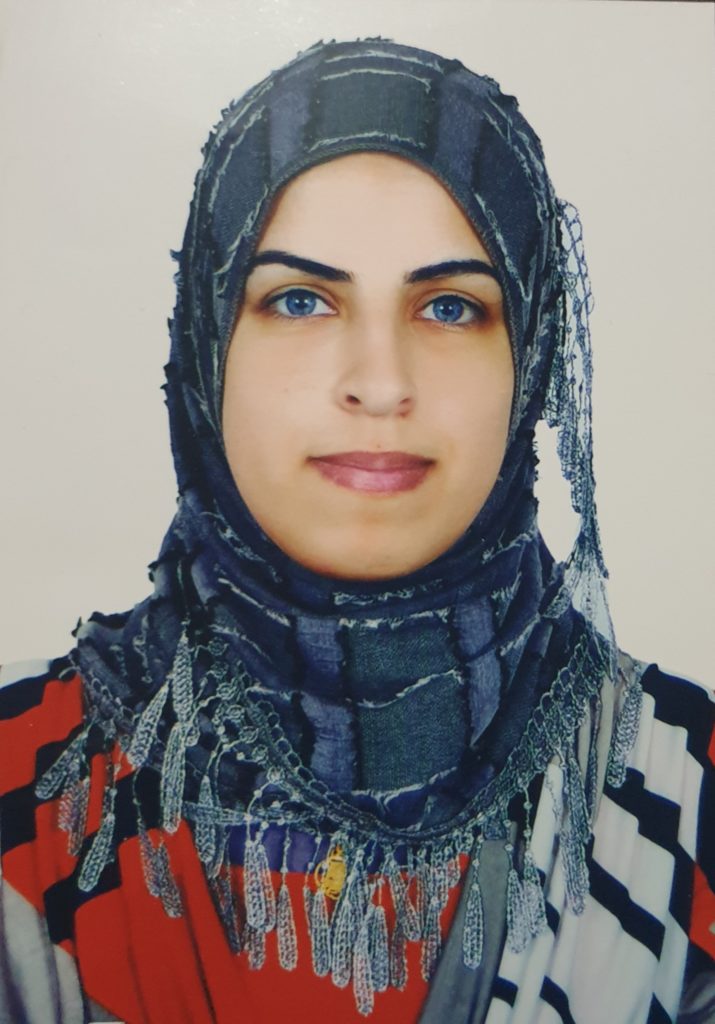
Hajar Zein (Lebanese University, Lebanon)
Hajar Zein is Lebanese, for 5 years now working as a librarian at the Ministry of Environment, formerly at the Lebanese Standards Institution – LIBNOR for 3 and half years, before that she worked for five years at Sheikh Bahauddin Ameli Public Library. She holds a BA in history and another in Records Management & Archiving, a master’s student in the Department of Information Sciences at Information Faculty Lebanese University (awaiting date of discussion) and a student at the Arabic Manuscripts Institute – Cairo (finishing her diploma project about Arabic Manuscripts MARC Cataloging).
Measuring and Evaluating Performance in University Libraries Using ISO 11620-2014: Lebanese University – Library of Medical Sciences as a Model
This research deals with the concept of performance measurement, evaluation, standards and its application in university libraries for the first time. The results of this research will benefit library specialists, staff and administrators who wish to develop library services and resources that focus on users and contribute to improving the performance of staff. This research used the descriptive analytical method, field study and questionnaire, two samples were chosen to be studied applying stratified random sampling which are lecturers and students at the Lebanese University: Faculty of General Medicine, Faculty of Dentistry and Faculty of Pharmacy. Therefore, 184 forms were sent via emails and hatsapp to lecturers, only 11 responded which makes this sample of no use to study. As for students, 306 forms were distributed, and 213 were retrieved, which is equivalent to 69.6% of the total number of forms. Only 130 of it (61%) responded to the questions, while the remaining (39%) did not visit the library at all. The research questions included: available facilities and tools, library collection, quality and satisfaction of services, frequency and use of the library, staff effectiveness and skills and the extent of their cooperation with students… The research results showed the big difference between expected performance and actual performance, which was manifested by the weakness of the library collection and services in the library. It demonstrated users’ needs to extend working hours, provide and improve facilities and enhance information technology. After collecting information and analyzing the results, the standard ISO 11620-2014 was applied after selecting several valid indicators to be used in the library of medical sciences which confirmed the opinions of the users regarding the weakness of the services provided. In an effort to reconcile the expectations and needs of the users, the research concludes several suggestions from the students’ responses and comments, including: increasing working hours, remote access to electronic resources, improvements in technology, increasing the number of staff and training them, and increasing facilities and tools. The research also recommended to adopt the culture of assessment for academic libraries and to development strategies to measure the quality of services and information resources and evaluate it to reach the stage of determining the effectiveness of the library from the perspective of the user. In other words, evaluation studies should be conducted and directed to focus on the user when evaluating information services, as well as participating in the development or/and adoption of specialized standards. All this cannot be done without the concerned department as it is the decision maker in all matters regarding the library.
Pour voir la présentation de/To see the presentation of Hajar Zein : https://youtu.be/Al-7ReRuim4?list=PLHgr5ZnpF46vhH43sq2Vvfo_6lkgtj8dW
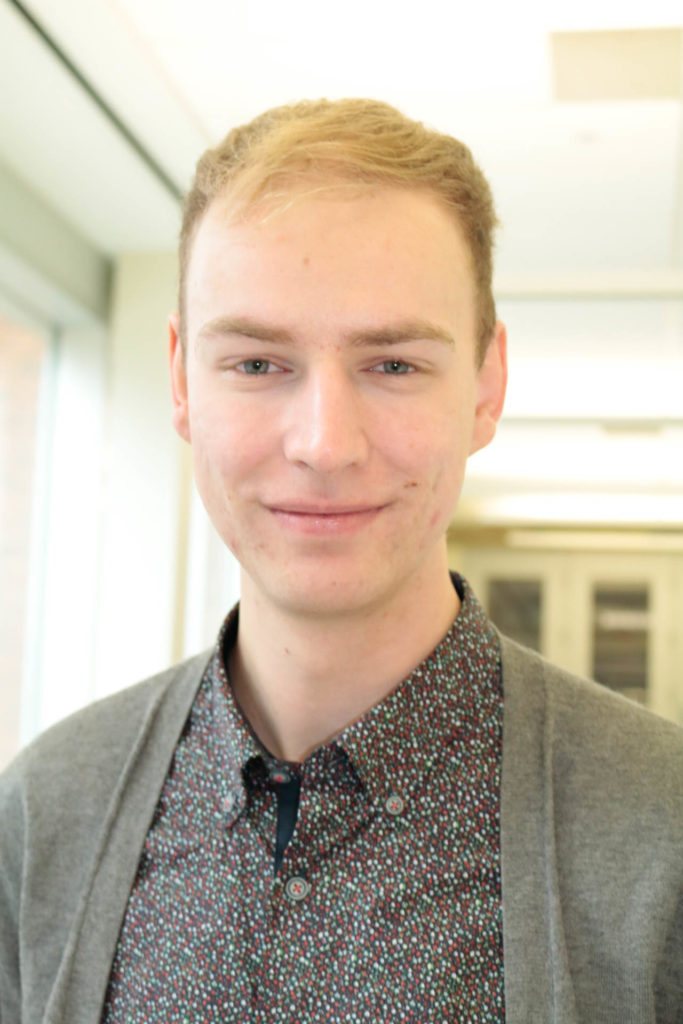
Gavin Goodwin (McGill University, Quebec, Canada)
Gavin Goodwin is a Master of Information Studies student at McGill University and currently works as a Student Reference Librarian at Concordia University. His previous degrees include a Master of Music Degree from Bowling Green State University and a Bachelor of Music degree from the University of Alberta. Gavin’s research activities include study of sexual health information for sexual minorities and the use of diverse creator identities in the cataloguing of musical scores. His research interests also include open access, scholarly communication, and digital scholarship.
Social Media, Grindr, and PrEP: Sexual health literacy for men who have sex with men in the Internet age
Despite continued improvements to HIV/AIDS treatment and awareness, HIV transmission rates remain high among men who have sex with men (MSM). Online consumer health information targeting high-risk MSM through social media and geosocial networking (GSN) apps have shown to be successful HIV intervention strategies. This oral presentation will present the findings of a review article due for publication in the Journal of Consumer Health on the Internet, which addresses (1) the efficacy and acceptance of delivering consumer health information about pre-exposure prophylaxis (PrEP) and HIV prevention through GSN apps, (2) the impact of online and social media communities in the discussion and delivery of information about PrEP and HIV interventions, and (3) on-going and possible future research and the role of information professionals. The outcomes of this review offer useful guidance for consumer health professionals and addresses fields such as librarianship, knowledge management, and human-computer interaction.
Pour voir la présentation de/To see the presentation of Gavin Goodwin : https://youtu.be/tMACQCx3o60?list=PLHgr5ZnpF46vhH43sq2Vvfo_6lkgtj8dW
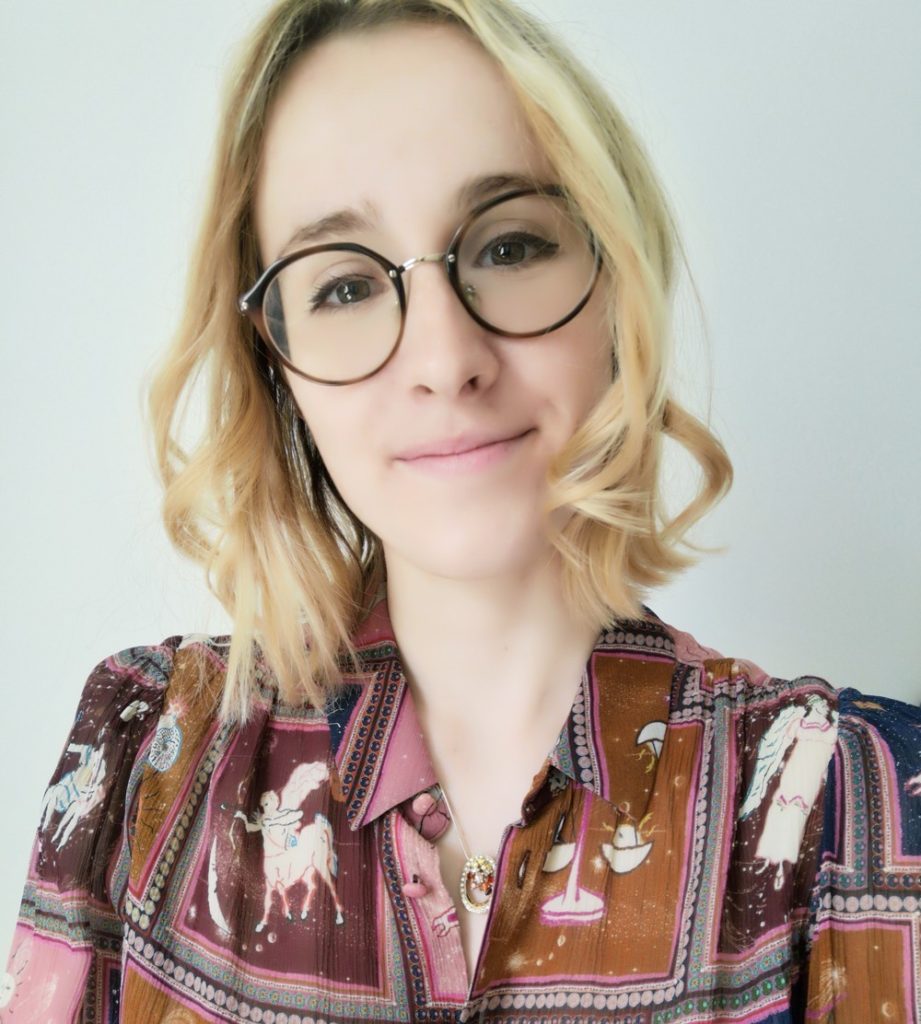
Estelle Cepparo (Université d’Angers, France)
L’attrait d’Estelle Cepparo pour la culture anglo-saxonne l’a conduite à débuter ses études par une licence d’anglais. Plusieurs expériences professionnelles ainsi que la réalisation de stages ont confirmé son intérêt pour les archives courantes et intermédiaires. Actuellement étudiante de première année en master Archives à l’Université d’Angers (France), elle étudie la nouvelle norme du Conseil international des Archives pour la description archivistique : Records-in-Contexts. Intéressée par les graphes, son mémoire a pour objectif de démontrer les avantages et les limites de ce type de visualisation pour l’utilisateur final.
Records-in-Contexts, quand la description archivistique rencontre l’approche ontologique : quel est l’intérêt de la représentation graphique pour la compréhension et l’exploitation des ressources archivistiques ?
La communication que je vous propose porte sur le sujet de recherche sur lequel je travaille dans le cadre de ma première année de master Archives à l’Université d’Angers (France). Ce mémoire porte sur la nouvelle norme de description archivistique Records-in-Contexts (RiC) développée par le Conseil international des archives. Il proposera un tour d’horizon des modèles conceptuels nationaux ayant inspiré RiC tels que l’initiative binationale australienne et néo-zélandaise en 2008, l’initiative espagnol en 2012 et l’initiative finlandaise en 2013. Ce mémoire analysera également les modèles conceptuels des communautés professionnelles voisines qui ont également servi d’exemple pour RiC : le modèle conceptuel pour la description bibliographique FRBR et le modèle conceptuel pour la description des objets muséaux CRM. J’étudierai également l’organisation du groupe d’experts sur la description archivistique (EGAD) : quels en sont les acteurs, la méthodologie adoptée pour l’élaboration de RiC, les consensus trouvés pour établir un modèle conceptuel international. Ce mémoire rendra compte des difficultés rencontrées par les membres de l’EGAD, des outils utilisés et des différentes étapes de développement de RiC, notamment au travers d’entretiens auprès des personnes clés dans la création de RiC . La finalité étant de se questionner sur les effets de la représentation graphique dans l’appréhension des données archivistiques : comment cela se traduit-il du point de vue de nos fonctions cognitives ? En quelle mesure ce type de visualisation permet-il d’améliorer la compréhension et l’exploitation des ressources archivistiques ? Quel intérêt cette approche ontologique présente-t-elle pour l’utilisateur final ?
Pour voir la présentation de/To see the presentation of Estelle Cepparo : https://youtu.be/HAPFFJU5xLA?list=PLHgr5ZnpF46vhH43sq2Vvfo_6lkgtj8dW
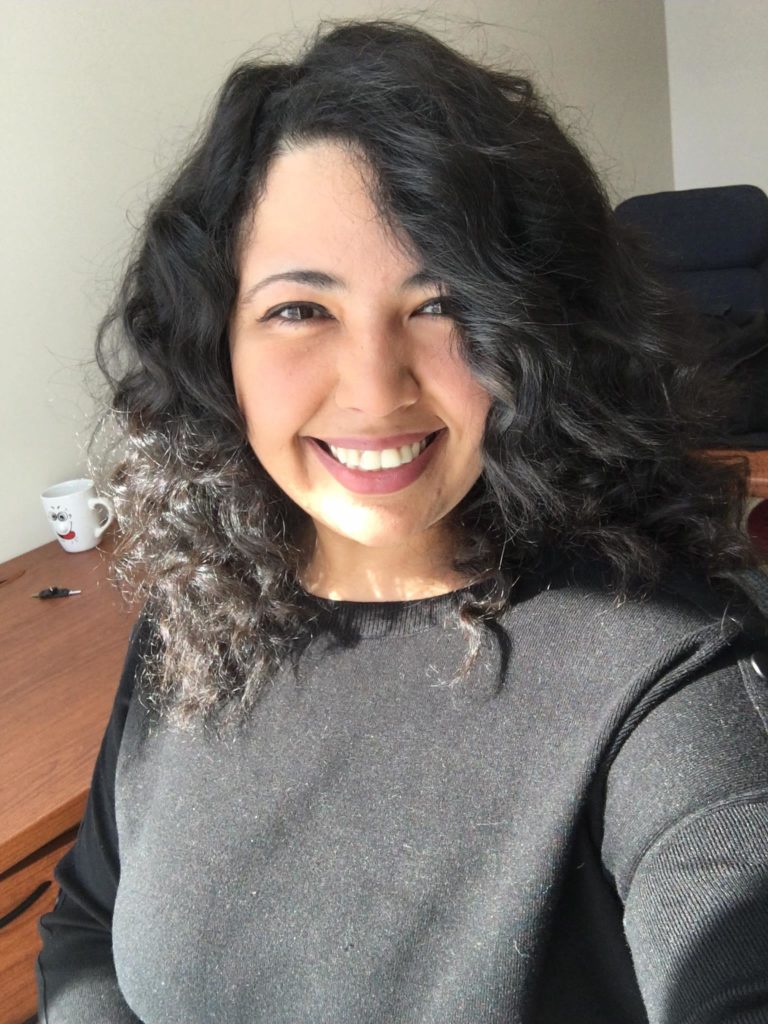
Siham Alaoui (Université de Laval, Québec, Canada)
Siham Alaoui est candidate au doctorat sur mesure en archivistique et en communication publique à l’Université Laval, Québec (Canada). Elle détient un baccalauréat en sciences de l’information (obtenu en 2013 auprès de l’École des sciences de l’information, Maroc) et une maitrise en sciences de l’information (obtenue en 2015 auprès de l’Université de Montréal). Elle s’intéresse à la médiation documentaire numérique, notamment dans le contexte actuel d’ouverture et de participation citoyenne. Elle est auteure de plusieurs articles scientifiques et professionnels publiés dans des revues spécialisées en sciences de l’information (ex. Archives, Revue canadienne des sciences de l’information et de bibliothéconomie, Documentation et Bibliothèques, Argus, Comma, Les Cahiers de la Documentation).
La gestion de l’information dans une perspective ouverte : un nouveau
« contrat » ?
Les développements spectaculaires engendrés par le numérique amènent de nos jours les institutions publiques à faire preuve d’une meilleure ouverture envers les citoyens. Celle-ci se veut à la fois (1) politique (gouvernement ouvert : open government), misant sur la transparence, la participation et la collaboration citoyenne, (2) institutionnelle (gouvernement en ligne : e-government), reflétant la mise en ligne de l’information sur les services publics et l’amélioration de la qualité de ceux-ci, et (3) technologique incarnant la libération des données gouvernementales ouvertes (open government data) sous une forme réutilisable par les citoyens. L’ouverture, dans ses trois dimensions, commande dès lors une gestion de l’information dans une perspective ouverte, où une pluralité d’acteurs collaborent afin d’améliorer la qualité de l’information, à la fois sur le plan archivistique (authenticité, fiabilité, intégrité, exactitude, intelligibilité), communicationnel (pertinence, actualité, découvrabilité) et technique (interopérabilité, sécurité). Or, ces acteurs, lesquels sont représentés par les propriétaires (dirigeants, responsables d’accès, officiers de gouvernance, etc.), les concepteurs (les archivistes, les gestionnaires de documents, les spécialistes en technologies de l’information, les communicateurs, etc.) ainsi que les usagers internes (les agents administratifs) et externes (le grand public), ne possèdent pas les mêmes attentes envers l’information et ne poursuivent pas les mêmes finalités. Cela traduit la nécessité de se doter des mécanismes de gouvernance et de régulation, conférant à chaque acteur une certaine légitimité dans ce contexte collaboratif. Cette communication rend compte d’un projet de recherche doctorale autour de cette problématique : nous y présentons les grandes lignes du projet, le cadre théorique ainsi que l’approche méthodologique adoptée.
Pour voir la présentation de/To see the presentation of Siham Alaoui : https://youtu.be/1YTDEsKUIBI?list=PLHgr5ZnpF46vhH43sq2Vvfo_6lkgtj8dW
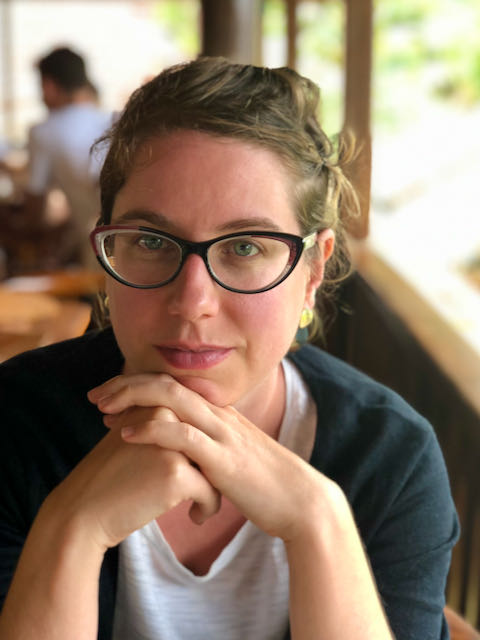
Virginie Paquet (Université de Montréal, Québec, Canada)
Virginie Paquet est étudiante à la maîtrise en sciences de l’information à l’École de bibliothéconomie et des sciences de l’information de l’Université de Montréal. Elle s’intéresse à la façon dont l’information scientifique est diffusée et elle souhaite la rendre plus facile à trouver et à comprendre. Elle aimerait un accès plus équitable aux connaissances pour toutes et tous, que ce soit par le biais du libre-accès, de la dissémination des connaissances ou par l’enseignement de la littératie informationnelle.
La longue route vers le libre-accès au Canada et le cas particulier du Québec
Bien que son importance soit déjà évidente, la pandémie de COVID-19 a remis de l’avant l’urgence d’accélérer la publication en libre-accès de la littérature scientifique. Cette analyse bibliométrique présente, pour la période 2015-2019, la proportion d’articles en libre accès des chercheurs au Canada en fonction de la langue de publication (anglais ou français) et de leur institution d’attache, et mesure la proportion d’articles en libre accès financés par les principaux organismes subventionnaires canadiens. L’utilisation d’une nouvelle source de données (Dimensions.ai) permet d’actualiser et de compléter le portrait de la publication en libre-accès au Canada. Les données montrent une situation qui n’a pas beaucoup changé depuis des analyses publiées en 2018. Nous remarquons des différences disciplinaires et institutionnelles et aussi une différence de culture apparemment reliée à la langue de publication. Le facteur linguistique et notamment l’importance d’Érudit dans le contexte québécois semblent faire une différence importante et positionnent le Québec comme la province meneuse en ce qui a trait à la publication en libre-accès. Toutefois, une conclusion demeure : dans l’ensemble, malgré quelques différences culturelles, la recherche financée demeure inaccessible au Canada (généralement moins de 50% des publications en libre-accès et même une tendance à la baisse pour les travaux financés par les trois principaux organismes subventionnaires canadiens). Cette étude remet donc de l’avant le manque d’intérêt des chercheurs pour le libre-accès, mais aussi le manque d’incitatifs à respecter les politiques existantes.
Pour voir la présentation de/To see the presentation of Virginie Paquet : https://youtu.be/_08dfta0vFc?list=PLHgr5ZnpF46vhH43sq2Vvfo_6lkgtj8dW
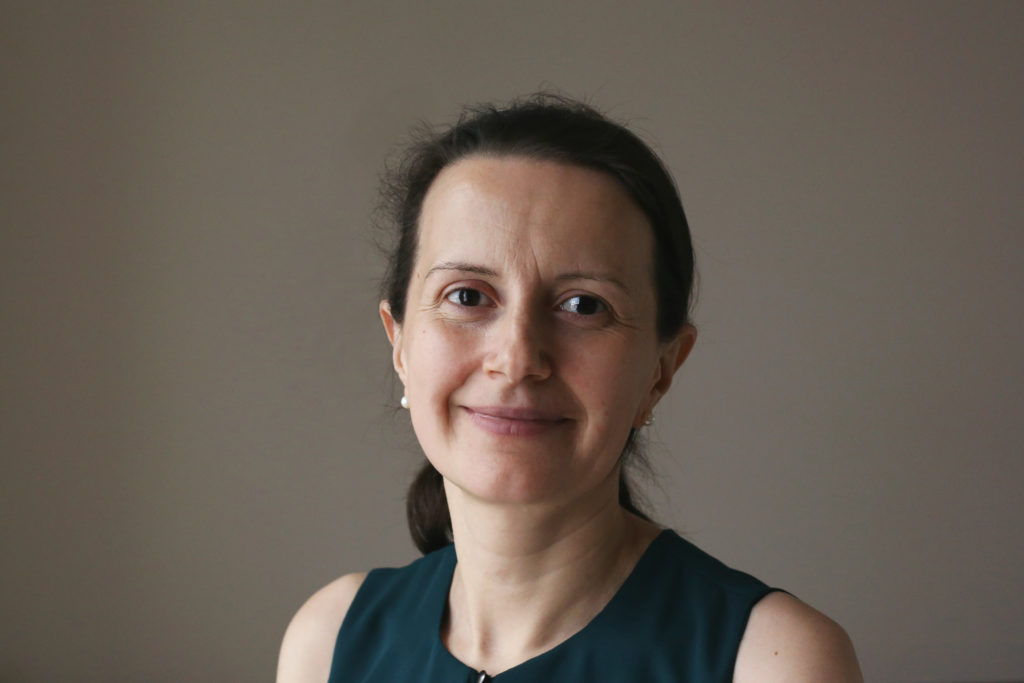
Vera Granikov (McGill University, Quebec, Canada)
Vera Granikov is an MLIS graduate (class of 2008) and a PhD candidate at the School of Information Studies at McGill University. Her doctoral project explores the role of collaboration in keeping up to date with scholarly publications. Between degrees, Vera gained invaluable experience coordinating research projects related to health information at the Department of Family Medicine (McGill University). She is passionate about information literacy, the value of information, collaboration, community, patient engagement, and citizen science.
Collaboration in keeping up to date: Preliminary results of a framework synthesis and a qualitative case study
Keeping up to date is fundamental to research. Nonetheless, researchers face various challenges related to information overload, time constraints, and insufficient evaluation skills. Collaboration (sharing the monitoring effort among group members) may be a solution. The goal of my doctoral project is to explore the factors and outcomes of collaborative information monitoring. The project consists of two phases. Phase 1: A systematic mixed studies review with framework synthesis was conducted to identify influencing factors and outcomes and generate a novel conceptual framework for collaborative information monitoring. Fifty-one studies were included and synthesised using thematic synthesis. The conceptual framework includes seven types of factors, five types of outcomes, and represents the first systematic attempt to bridge the literature on collaborative information seeking with environmental scanning/information monitoring. Phase 2: A collaborative information monitoring system, named eSRAP, allows groups to monitor research topics and share the ongoing work of identifying potentially relevant articles. Using a qualitative multiple case study approach, I explore system use and perceptions of eSRAP users. Each group monitoring a specific topic constitutes a case. Data collection involves semi-structured interviews, fieldnotes, system logs, search strategies and relevance criteria used by each case. All data is analyzed thematically, using themes from the conceptual framework (deductive coding) and generating new themes (inductive coding). Analyzed data are converged for each case (intra-case analysis) to produce indepth case reports, and cases are compared to draw cross-case conclusions (inter-case analysis). In this presentation, I will share the conceptual framework and preliminary results from one case.
Pour voir la présentation de/To see the presentation of Vera Granikov : https://youtu.be/uECXWJGlXgo?list=PLHgr5ZnpF46vhH43sq2Vvfo_6lkgtj8dW
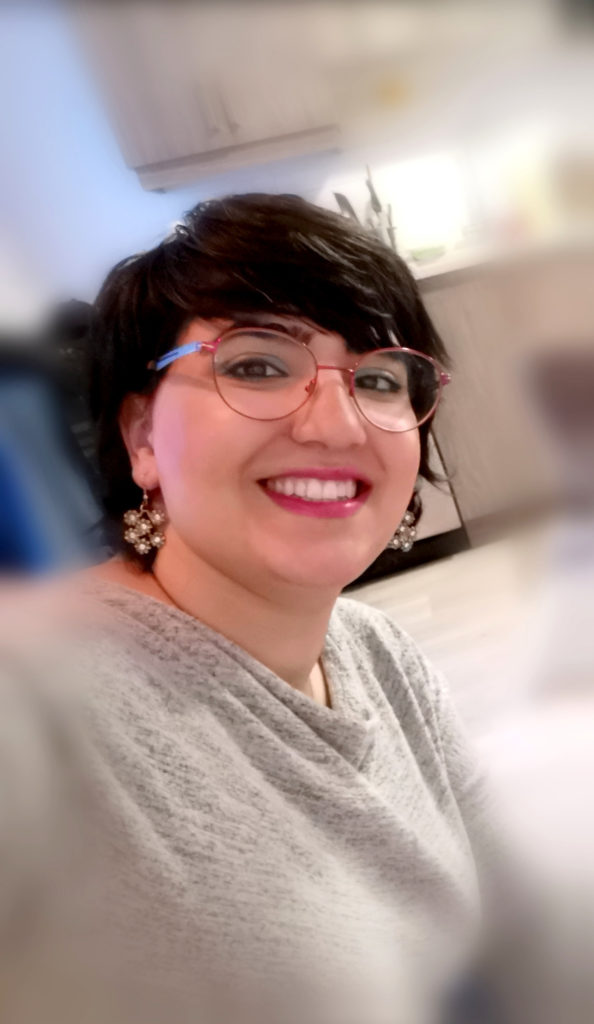
Shahrazad Rahmé (Université de Montréal, Québec, Canada)
Shahrazad Rahmé est doctorante en sciences de l’information à l’Ecole de bibliothéconomie et des sciences de l’information (EBSI) de l’Université de Montréal. Elle vient du Liban avec une maîtrise et aussi un baccalauréat en sciences de l’information de l’Université Libanaise. Sa recherche porte sur l’indexation automatique et le repérage des images numériques. Le choix de ce sujet de recherche s’est fait à travers son expérience de travail, pour 3 ans, dans un centre d’information d’une institution médiatique où elle indexait les images manuellement. Elle a fait beaucoup de stages volontaires dans des bibliothèques universitaires, des médiathèques et des institutions d’archives nationales.
Indexation automatique et repérage des images numériques
Le sujet de notre projet de recherche est l’indexation automatique et le repérage des images numériques. Actuellement, nous avons une augmentation très rapide du nombre d’images numériques dans les centres d’archives et sur le web. Nous cherchons dans ce projet à résoudre le problème de l’indexation traditionnelle effectuée par les professionnels de l’image sous forme manuelle. Cette indexation est couteuse en temps et en argent et doit être remplacée par des méthodes automatiques à travers des systèmes informatiques. Notre projet de recherche vise à évaluer l’efficacité des systèmes automatiques conçus pour l’indexation et le repérage d’images par le contenu et à examiner les facteurs influençant la satisfaction des professionnels de l’image par rapport aux résultats de recherche offerts par ces systèmes. Cette étude adopte un devis expérimental portant sur deux unités d’analyse : 1) les systèmes d’indexation et de repérage d’images par le contenu (composante quantitative) et 2) les professionnels de l’image (composante qualitative). La collecte des données va se faire auprès d’un groupe de 15 à 20 professionnels de l’image qui va lancer la recherche d’image sur un nombre de 10 à 20 systèmes d’indexation et de repérage d’images par le contenu, à travers des requêtes visuelles (image-exemple ou croquis). À la suite de cette expérience, nous allons faire des entrevues semi-dirigées avec chacun des professionnels de l’image dans le but de connaître leur opinion sur la recherche d’images avec ces systèmes. L’analyse du repérage d’image dans cette expérience nous permettra de savoir à quel degré nous pouvons remplacer l’indexation manuelle faite par les professionnels de l’image par l’indexation automatique réalisée par les systèmes informatiques, et à quel degré les chercheurs d’images ont satisfait leur besoin en images à travers la recherche sur les systèmes d’indexation et de repérage d’images par le contenu.
Pour voir la présentation de/To see the presentation of Shahrazad Rahmé : https://youtu.be/wik3hc-ybIE?list=PLHgr5ZnpF46vhH43sq2Vvfo_6lkgtj8dW
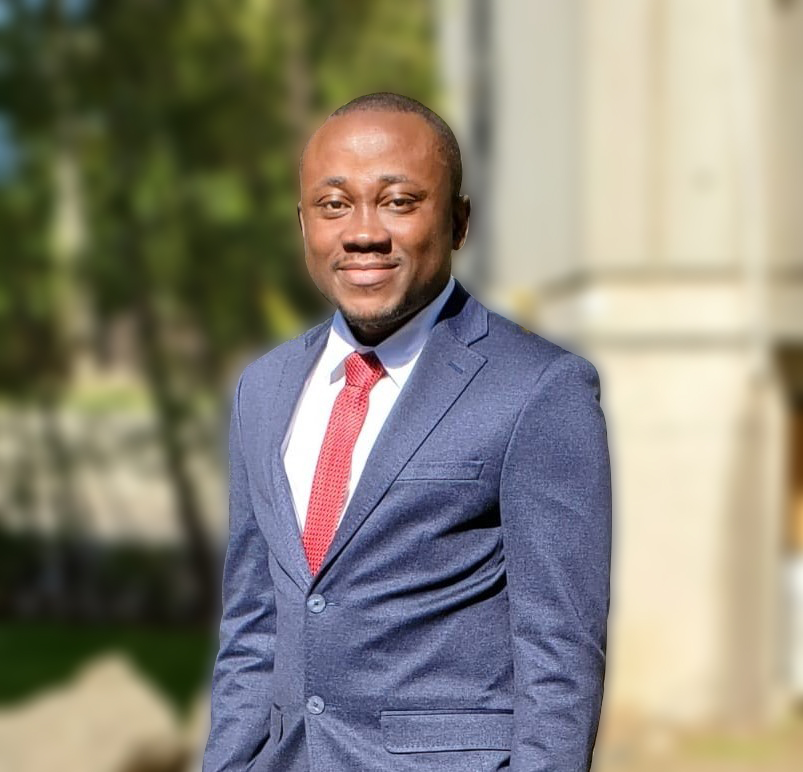
Richmond Yeboah (McGill University, Quebec, Canada)
Richmond Yeboah, a final semester master student at the School of Information Studies, McGill University. He holds a Bachelor of Arts degree with specialization in publishing studies. He is interested in research about information seeking behavior particularly in relation to access and information seeking barriers. He is currently working on a paper on neutrality as a value for information professionals and value perceptions of information sources among academic librarians.
Value perceptions of information sources among academic librarians
The increase in use of the digital medium for publishing information has made information creation easier and cheaper resulting in abundance of information as observed in the case of academic information (Wang, et al 2012). The existence of abundance of information sources poses the problem of information overload and choices. Information sources can be grouped into two based on cost: free sources and paid sources. Previous studies have established that people tend to have good perceptions about products with high prices compared to those they get for free (Plassmann, et al, 2008). Will information seekers prefer free to paid sources and how can information providers take advantage of the phenomenon in comparison to other factors influencing information source choices to draw information seekers to their contents? This study sought to examine: -the importance of the cost of access to information seekers compared to other factors considered when selecting information sources, -how they perceive the value of free and paid sources, -and their willingness to use paid information sources. This study was a preliminary study for a PhD dissertation using the exploratory method (experience survey sampling) which surveyed librarians working at the McGill and Concordia university libraries. This study will contribute to the academic discourse on making information available for free or for a fee. It will also help information providers/publishers to make the right decisions about cost, interface design and content. Information literacy personnel’s can also draw from it and educate information seeker on the psychology of seeking information.
Pour voir la présentation de/To see the presentation of Richmond Yeboah : https://youtu.be/VnBp9ctNjFM?list=PLHgr5ZnpF46vhH43sq2Vvfo_6lkgtj8dW

David Ireland (McGill University, Quebec, Canada)
David Ireland is finishing his Master of Information Studies degree at McGill University. He also has an M.Phil. in Linguistics from Trinity College Dublin. The focuses of his current studies are archiving and book history of various forms. He has started to narrow his studies for a PhD to chapbooks—small books containing poems, folk tales, etc. He wants to look at their intersection with literary culture and literacy teaching as these were inexpensive books that anyone could have.
A Small Presentation about Small Books
My presentation is a short introduction to chapbooks. McGill’s library has a large, digitized collection of chapbooks, and I hope to address some of the material aspects of chapbooks—how were they printed, circulated, etc.—and how these books were used in literary culture. Another interest surrounding chapbooks is how the common stories in these books changed over time or among different printers.
Pour voir la présentation de/To see the presentation of David Ireland : https://youtu.be/0u7VGgqZEIc?list=PLHgr5ZnpF46vhH43sq2Vvfo_6lkgtj8dW
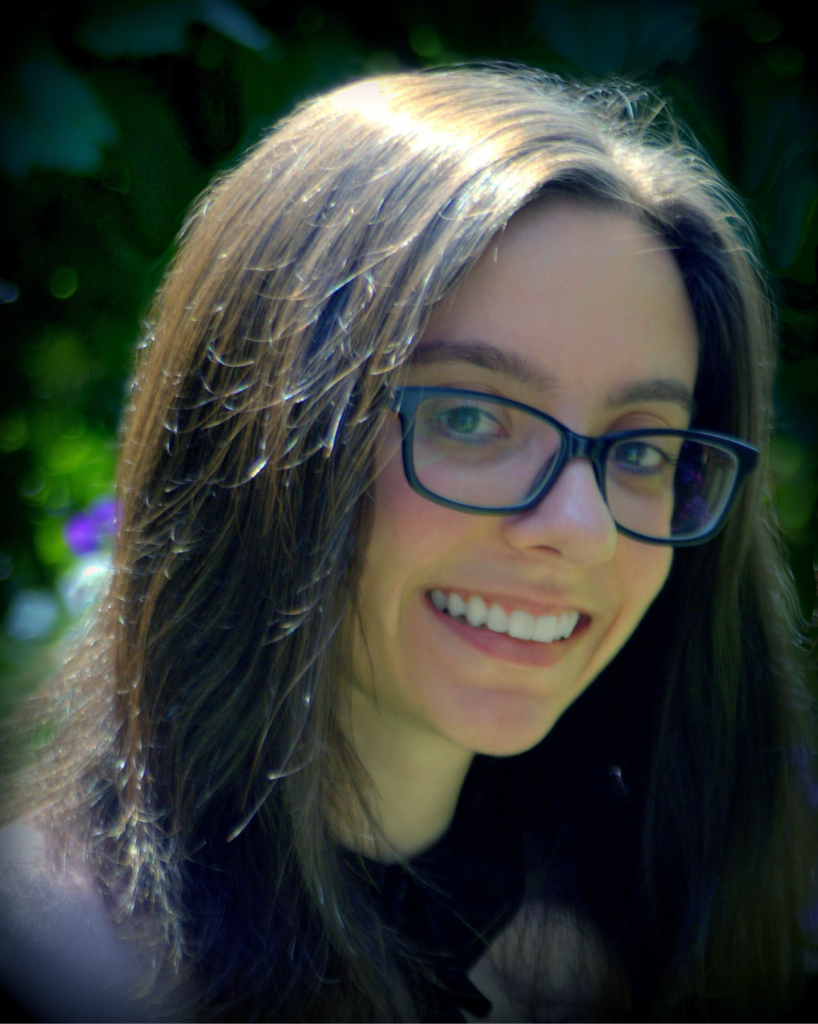
Sofie Tsatas (McGill University, Quebec, Canada)
Sofie Athanasia Tsatas is a music historian and aspiring archivist currently pursuing her Master’s degree in Information Studies at McGill University. She received her Bachelor’s degree in Music from McGill University and her M.A. in Musicology from the University of British Columbia. Her research interests include decolonization and music, accessibility, and mental health, and how those are reflected in archives and archival spaces.
Decolonized Listening in the Archive: A Study of How a Reconstruction of Archival Processes and Spaces can Contribute to Decolonizing Narratives and Listening
In 2019, Dylan Robinson and Candice Hopkins began touring their exhibition Soundings: An Exhibition in Five Parts, which asks “How can a score be a call and tool for decolonization?” In response to this question, Indigenous artists contributed scores in the form of beadwork, graphic notation, written instructions, and other works, that offer “instructions for sensing and listening to Indigenous histories that trouble the colonial imaginary” (Robinson, Hopkins). Drawing upon the exhibit Soundings, as well as Robinson’s book Hungry Listening (2020), this proposal seeks to understand how to decolonize archives in ways that impact the appraisal, preservation, and experience of music created by Indigenous artists. Additionally, Hungry Listening argues that by increasing our awareness of and acknowledging our settler colonial listening habits, we can engage in decolonial listening practices that can deepen our understandings of how Indigenous song functions in history, medicine, and law. The main research questions of this study are: how can we apply decolonized listening to archival spaces? How can we ensure that Indigenous scores remain decolonized in an archive? Archival spaces maintain colonial ideologies and narratives through the acts of appraisal and preservation. Nonetheless, this study suggests that by engaging in post-custodianship and in the dismantling and re-constructing of archival spaces and processes, decolonial narratives and listening can thrive.
Pour voir la présentation de/To see the presentation of Sofie Tsatas : https://youtu.be/8oLRGAwoe9g?list=PLHgr5ZnpF46vhH43sq2Vvfo_6lkgtj8dW

Philips Ayeni (McGill University, Quebec, Canada)
Philips Ayeni is a PhD Candidate at McGill School of Information Studies, Montreal Canada. With a background in library and information studies, he has worked as a librarian in both school and special (Law) libraries in Nigeria. In Canada, he has worked as teaching and research assistant, and is currently working to develop a data repository for iMPACTS’ SSHRC funded project. He is passionate about the current development in scholarly communication, hence focusing his research on the open access scholarly communication practices of researchers in Canada. He is the current Chair of the Association for Information Science & Technology, McGill Student chapter.
A systematic review of library services provision in response to COVID-19 pandemic (Philips Ayeni ; Blessed Agbaje ; Maria Tippler)
Libraries have had to temporarily shut their doors because of the COVID-19 pandemic, resulting in the provision of online and remote services. This review analyzed services offered by libraries, technological tools used, and the challenges facing libraries in a global pandemic. This study employed a systematic literature review, following the PRISMA protocol (Moher et al., 2009). Building Blocks search strategy was employed to search for keywords of concepts in Library and Information Science Abstract (LISA), Library and Information Science Technology Abstract (LISTA), Library Science Database, Web of Science core collections and Google Scholar. A set of inclusion and exclusion criteria was pre-determined by the authors prior to database searching. The first set of searches produced 3,499 results. After we removed duplicates, and applied inclusion/exclusion criteria, 23 articles were finally selected for the synthesis. The included studies were conducted in the United States of America (26%), India (17%), and China (9%) and several other countries. Findings show that libraries are providing and expanding access to electronic resources, increasing open access resources, assisting in virtual education, and bolstering public health safety through health literacy. More so, libraries are supporting research efforts of faculty and students, as well as engaging in virtual reference services, among others. Libraries are harnessing educational, social networking and communication technologies, but limited in their financial capabilities. This study provides an overview of the ways libraries have responded to the challenges posed by a global pandemic, and hence will be of use and interest to all librarians especially those in health and academic sectors.
Pour voir la présentation de/To see the presentation of Philips Ayeni : https://youtu.be/G4QeXVOzNMs?list=PLHgr5ZnpF46vhH43sq2Vvfo_6lkgtj8dW
Membres du Jury 2021 Jury members
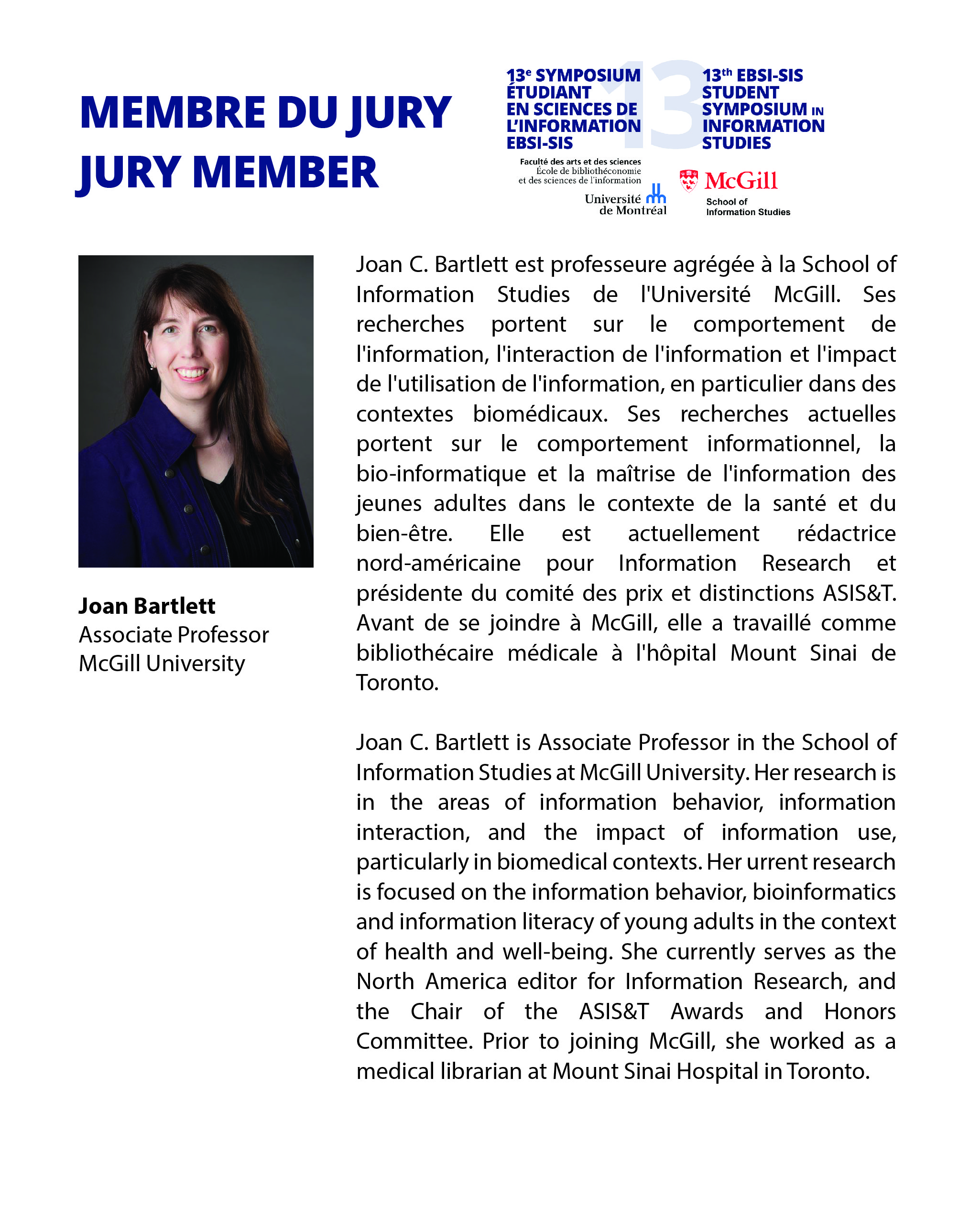
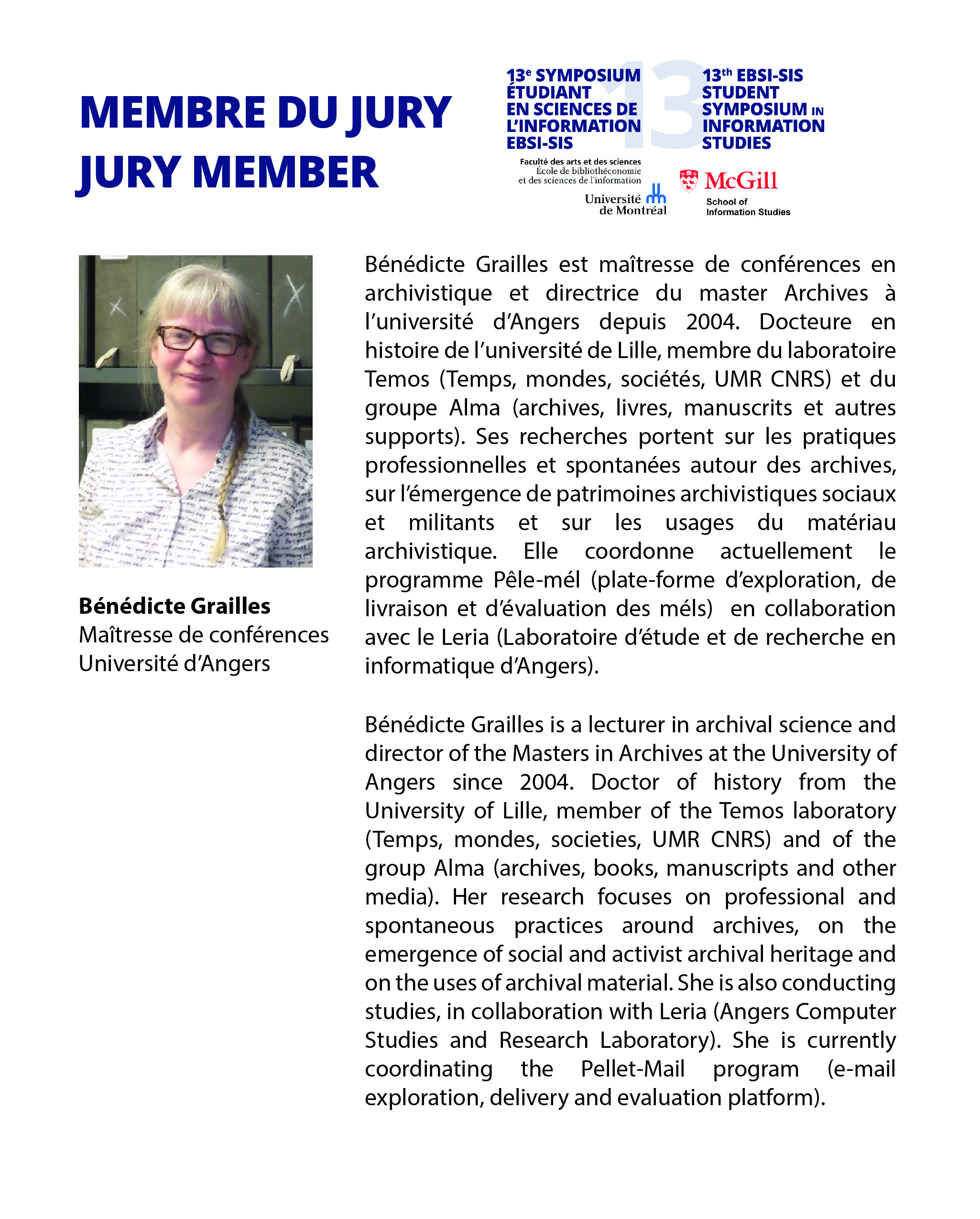
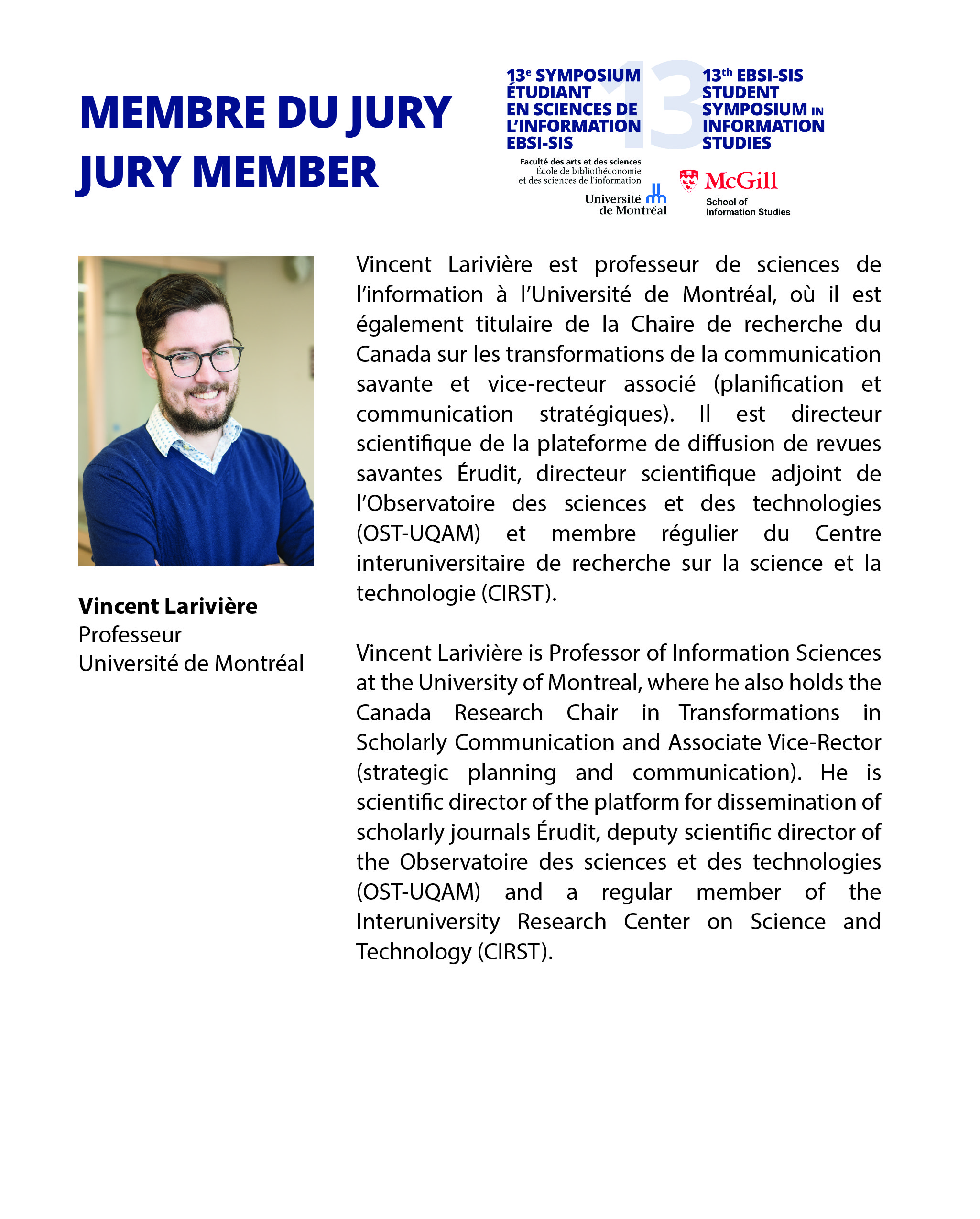
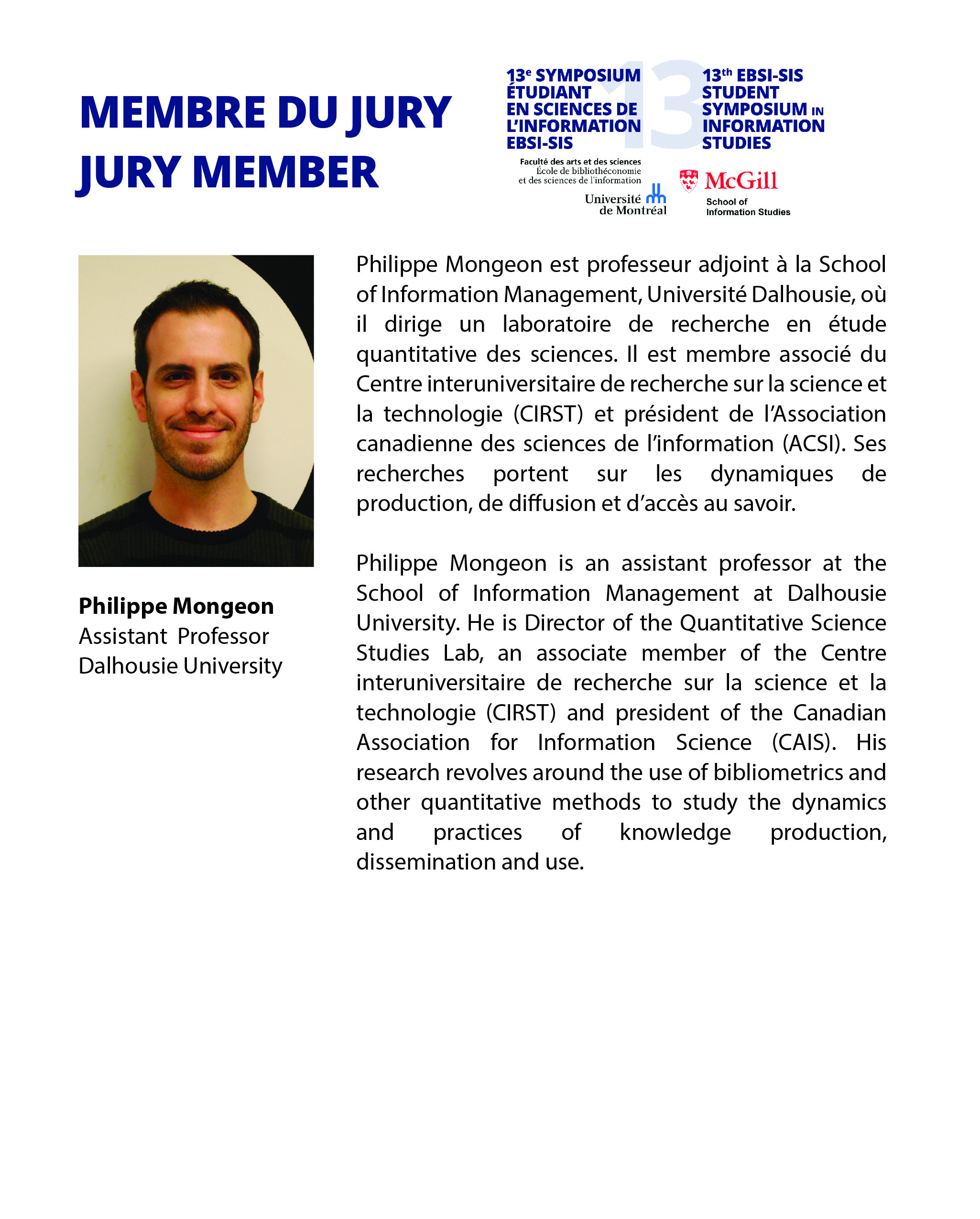
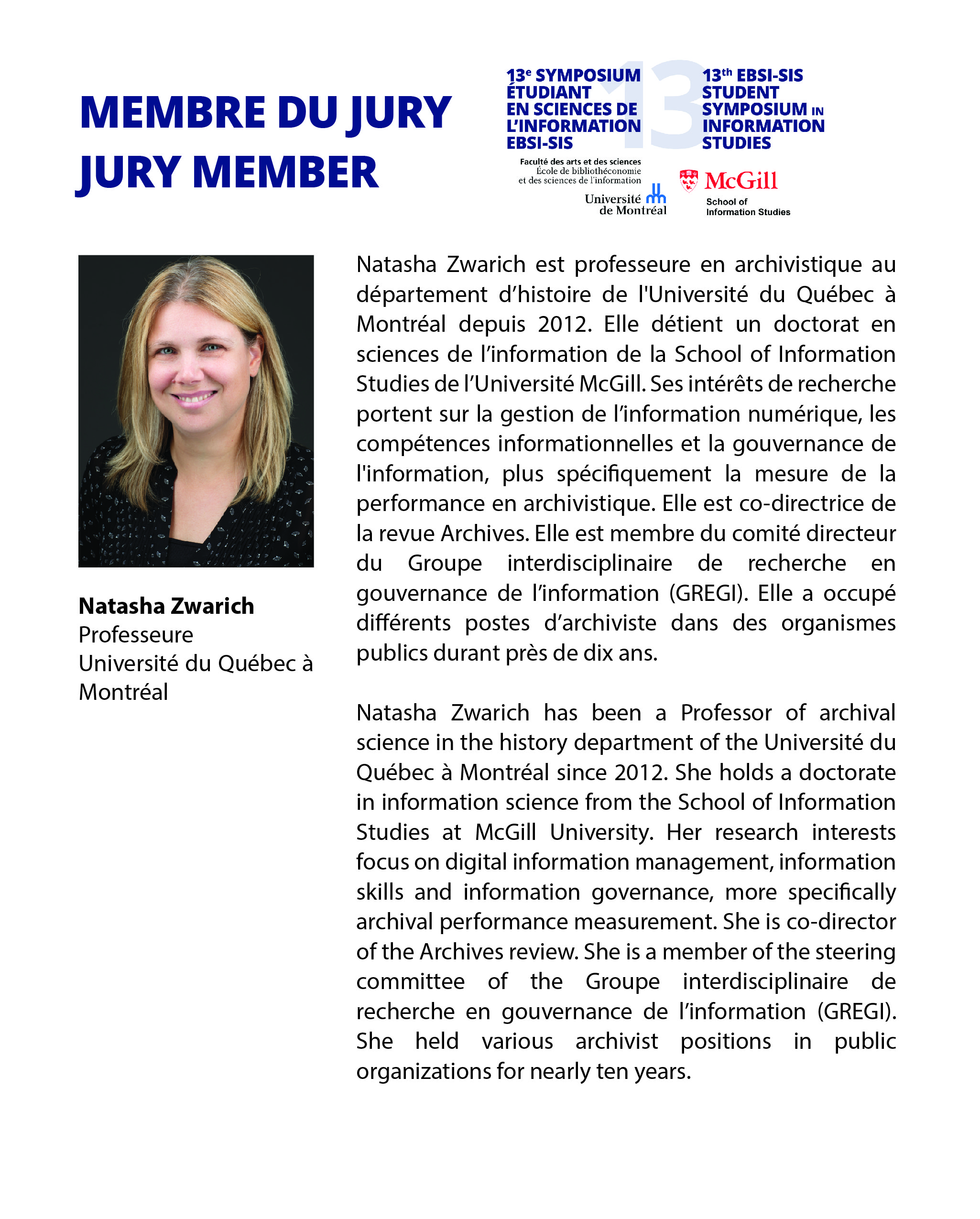
Gagant.e.s 2021 Winners
Meilleure présentation par affiche doctorale : Stéphanie Courchesne (Université de Montréal, Québec, Canada)
Meilleure présentation par affiche master/maîtrise : Estelle Cepparo (Université d’Angers, France)
Meilleure présentation orale doctorale : Vera Granikov (McGill University, Quebec, Canada)
Meilleure présentation orale master/maîtrise : Chelsea Woodhouse (McGill University, Quebec, Canada)
Félicitations aux gagnantes et à tous les participants à ce 13e Symposium. Ce fut un réel et franc succès. Nous nous revoyons l’année prochaine !
Membres organisateurs 2021 Organizing members
